Take a moment to think of an innovative company. What’s the first one that comes to mind?
This article is a condensed adaptation of an episode of the Aviva Podcast. If you're able to, we encourage you to listen to the full episode.
Transcript
Take a moment to think of an innovative company. What’s the first one that pops into your mind?
You might be thinking of one of the massive Silicon Valley tech firms.
You might, instead, be thinking of a tiny start-up. Someone changing the world from a bedroom in a semi-detached.
It’s likely that you’re not thinking about an insurer, though. That’s understandable. We don’t have a reputation for being the most exciting industry.
It makes sense – innovation is risky, and we’re the ones who offer protection from that very thing. Why would you want to rock the boat if you’re the one insuring it?
But insurance has been around for centuries, and with time comes change. Like the tides, there’s no use in trying to hold back either.
Through our ancestor companies, we can trace our origins back more than 325 years. We've been adapting, evolving and innovating to meet the ebb and flow of our customers’ changing needs since the 1600s.
“I mean, I think I'd describe us as ‘experienced’ as opposed to 325 years old,” said Owen Morris, managing director of personal lines insurance at Aviva.
“But it's a nice way to think about it. I think it shows we're doing something right. You don't survive that long without innovating.”
What would seem standard and commonplace now, wasn’t always so. The invention of the car, for example, was a huge innovation. It has, quite literally, reshaped our world. For better and for worse.
That invention also meant that insurers had to innovate to keep up. That, or be overtaken.
“Obviously, some of our predecessors had to innovate to cope with this new thing. And I think they did a good job in creating car insurance.”
Early vehicle insurance was wildly different to what you’d expect today, though. That makes sense. People walking ahead 60 yards, waving a red flag to warn bystanders of an oncoming car could only last so long. Cars got faster and more frequent, and we all had to adapt.
It’s the same for the pace of change. That’s only been getting faster and more frequent, too. It’s not enough to just react to change anymore. We need to predict what’s coming down the road, and it’s not always preceded by a red flag.
Thankfully, as insurers, anticipating the unexpected is second nature to us. It’s why we have our innovation team at Aviva, led by our Chief Innovation Officer, Ben Luckett.
“The Chief Innovation Officer role is really accountable for helping and supporting the organisation deliver competitive advantage and meet customer needs by delivering new ideas and new technologies.
“We split that into three things.
“We invest in start-ups through our venture capital fund.
“We build new businesses through our venture studio.
“We create new products and services through something called rapid proposition development.”
While innovation isn’t strictly one of our ‘four strategic pillars’ [link to strategy page] (customer, growth, efficiency, and sustainability) Ben explains that it underpins each of them.
“If we want to better serve customer needs, we need to understand them and innovate.
“If we want to grow, we need new products and services.
“If we want to deliver efficiency, often new technology is really, really helpful for that.
“And from a sustainability perspective, I think if we're going to meet some of our targets, investing in some of the technology, particularly around climate change that's really going to drive a difference, is really important.”
While there may not always be those red flags to warn of impending change, that’s not the case for climate change. People have been waving that flag for decades, and it’s only getting bigger.
The climate crisis is the greatest threat facing our planet.
We know that taking action now is the best thing we can do for our customers, business, shareholders and future. Just one of the many ways we’re acting is in the products we offer. We know we need purposeful propositions that help support our customers when they make environmental choices.
Aviva Zero stands out as a major example of this.
It's our carbon-conscious car insurance. For a limited time only, for an entire year after buying a policy, we're offsetting 100% of the carbon emissions that Aviva Zero customers create when driving or charging their car.
We work out their emissions based on the car they drive and their annual mileage, which they tell us about when they buy Aviva Zero car insurance. We also factor in real-world driving conditions that affect fuel use, like weather conditions and car maintenance.
If you're interested in how it all works, you can find out more and read the terms and conditions in the 'About your cover' section in the Aviva Zero help centre. There'll be a link to that in the show notes (https://zero.aviva.co.uk/faq)
So it's an innovative product that's supporting carbon offsetting projects that benefit people and their communities. It's also a great example of how we're driving our sustainability agenda forward through pr It’s something that the innovation team, led by Ben, helped Owen and the personal lines business bring to life.
But where did the idea come from? Ben told us its origins.
“I distinctly remember being on the phone one snowy February morning... for some reason, I was in my garden walking around, taking a phone call. I think that's what we did in lockdown. And I was talking to Owen. We were thinking about the concept of the carbon-conscious insurer.
“And that was the beginning really of Aviva Zero.”
“Owen was very passionate about this idea that we could create a new business in motor insurance, because there were so many things going on in that part of the industry - and still are.”
“It's almost a perfect storm.
“The genesis of the idea came from that phone call. And then it got turned into a concept, and we wanted to make sure that it landed with customers. And so, the idea evolved from there.
“And very quickly it turned from something on a PowerPoint to a product.
“That was the result of working together, to collaborating well, and using an innovative approach to proposition design.”
Owen elaborated on where the journey began for him, and the reasoning behind that phone call.
“It was one of the first things I did when I got this job. I wrote to our CEO and said, “I really think we need to make some substantial moves in terms of improving what we're doing in motor insurance”. For the customer - there were a couple of trends that were driving that request - but actually also for us, to make sure that we've got the technology to drive us forward.
“We've got electric vehicles. We've got more data coming from vehicles. We’re going to need to be able to insure electric vehicles for our customers. We need to be able to compete with our competitors to make sure that our offering is really good.
“Actually, technology itself is sitting behind that. Not vehicles using data to drive autonomously, but us using data to respond to that. So, you’ve got the ability for us to create seamless customer experiences in a very different way. So that's kind of sitting there.
“And the third thing that triggered it, and hence where the Zero came from, and it's really, really important: sustainability.
“How do we really create a proposition that has sustainability at its core, and we can build out from over time?”
That’s a good question. It’s one we posed to Ben. How do we build a proposition like this? What was the process like?
“The process was really taking that idea and making sure that it was something customers wanted and would buy into, and iterating that with customer feedback, building the technology, securing the funding, building a team and getting them into a space where they could operate at pace.”
Keeping the customer front of mind is key. It was something Ben was very clear on.
“One of the things that we try and do is really understand our customers and understand their needs and design things around those rather than starting with our own internal ideas or with our products.
“And there's a methodology that we use to do that, and that starts with what we call desirability. Understanding if it's something that a customer will want or buy. And then moving through into feasibility and viability.
“Traditionally, businesses have started the other way round. They said, is this something that we can build? Whereas we start with saying, is this something the customer will want?”
With all of that in place, we began to rapidly iterate. Ben had a target to launch Aviva Zero by our year-end results in March 2022. A seriously speedy turnaround that they achieved.
“That was, I think, a reflection of a good team working at pace in a dedicated environment with a single-minded focus.”
Owen told us a bit more about that journey to launch. It was quick, he says. Incredibly quick. It went from the first lines of code on a screen to the launch of the product in just a handful of months.
After all the work that went into over those months, taking it from code to customer – from zero to Zero, if you will – launches like this must be a big moment for the people who’ve been involved from the start.
“The excitement is palpable when you first start to see those first customers.
“But I'm older now than perhaps I was. Ten years ago, that would have been the height of the excitement.”
Owen explains that, for him, milestones are the real excitement now. When we spoke to him, back in November of 2022, a big one had just come through.
“I'm actually more excited by a milestone we got last week. We've sold over 30,000 policies now already.
“So, what I like about innovation at a large corporate like Aviva is it's not just affecting a few people or a bit of a niche. We can impact and have a positive benefit for millions of people, and that's what we want to do with Zero.
“When you start to get scale, you start to make that difference. Frankly, it's great to see it coming to life.”
Beyond the excitement was pride in our work.
“We put the team in a different space and created a different atmosphere, more like a start-up - to really encourage working together quickly and in an agile way and that was fantastic.
“So, innovation is often about a different culture and a different way of working. And Aviva Zero is a great example of that.
“I'm also really proud of the technology. We took some really interesting technologies and brought them together for Aviva Zero.
“And finally, I'm really proud of the product.
“We've launched it into the market in a really short space of time, and it's growing fantastically and combining a new product and also a carbon element to that, so people
can offset their miles that they drive, I think is really where the future of some of these products is going.”
“I think one of the reasons Aviva Zero worked, is we put the full weight of Aviva behind it.” Owen told us. “It wasn't ‘Oh, we just let some people get on with it over here.’
“I'm a big believer in terms of innovation that works for us has to work at scale. There's no point doing tiny things.
“What we set out to do with Aviva was build one of the best insurance companies there’s been in terms of core general insurance capabilities, what we’re doing for customers, that proposition... so we put the money behind it.
“We’ve got a brilliant team. We work with the best technology outfits. And we've really created something that's going great guns.”
As for Ben, his team is already working on the next big idea.
“The role of the innovation team is to really accelerate new ideas, to test, to learn. And then as we collaborate with the business units, they then take these things over to scale.”
“And we're kind of in that process now, of scaling with Aviva Zero, so the innovation team's role is declining.
“I'm personally still quite involved, but a lot of the team have moved on to look at new and different projects.”
While Aviva Zero is, as Owen put it, going great guns, history shows that innovations aren’t always a success. That’s part of the process, and a consequence of taking a road less travelled.
“It doesn't always have to be successful, though. I think some of the innovations I've tried over the years haven’t been, frankly. That's okay. What you’ve got to do is learn from them and build from them.
“And actually, if you never try anything, you'll never find that out.
“One of the wonderful things about being part of Aviva, of being part of a bigger group, is that we have loads and loads of eyes [to look ahead], so we have the benefit of some of the work Ben does in the innovation team.
“He just comes along and taps you on the shoulder and says “Have you thought about that? Have you seen that? What do you think of this?” And that is really, really helpful.”
We ended our conversation with Ben by asking him what he sees coming down the road – or at least what he thinks might be. What some of those taps on the shoulder might be about in the coming months and years.
“There are a few areas that I think are really exciting.
“I mentioned earlier about technology driving greater efficiency. And I think we'll continue to see a lot of innovation in automation and artificial intelligence, making things both better for the customer and more efficient.
“I also talked about sustainability, which is a really, really exciting, growing area, and I think we'll continue to see innovation there in terms of some of the technologies that can support the decarbonisation agenda and also the ESG (Environment, Social and Governance) reporting agenda.
“And then finally, I think insurance is becoming much more customer centric. A lot of the technologies that we've seen over the last few years are focused on much better customer experience, making things easier, frictionless.
“I think we'll continue to see innovation in that space and that's really exciting.”
Think of an innovative company. What’s the first one that pops into your mind?
Hopefully, with the work that Ben and the innovation team are doing, and products like Aviva Zero, it’s a bit more likely to be Aviva.
Take a moment to think of an innovative company. What’s the first one that comes to mind?
You might be thinking of one of the massive Silicon Valley tech firms.
You might, instead, be thinking of a tiny start-up. Someone changing the world from a bedroom in a semi-detached.
It’s likely that you’re not thinking about an insurer, though. That’s understandable. We don’t have a reputation for being the most exciting industry.
But Aviva can trace its origins back more than 325 years, and with time comes change. We've been adapting, evolving and innovating to meet our customers’ changing needs since the 1600s.
“I mean, I think I'd describe us as ‘experienced’ as opposed to 325 years old,” said Owen Morris, Managing Director of Personal Lines Insurance, UKGI, at Aviva.
“But it's a nice way to think about it. I think it shows we're doing something right. You don't survive that long without innovating.”
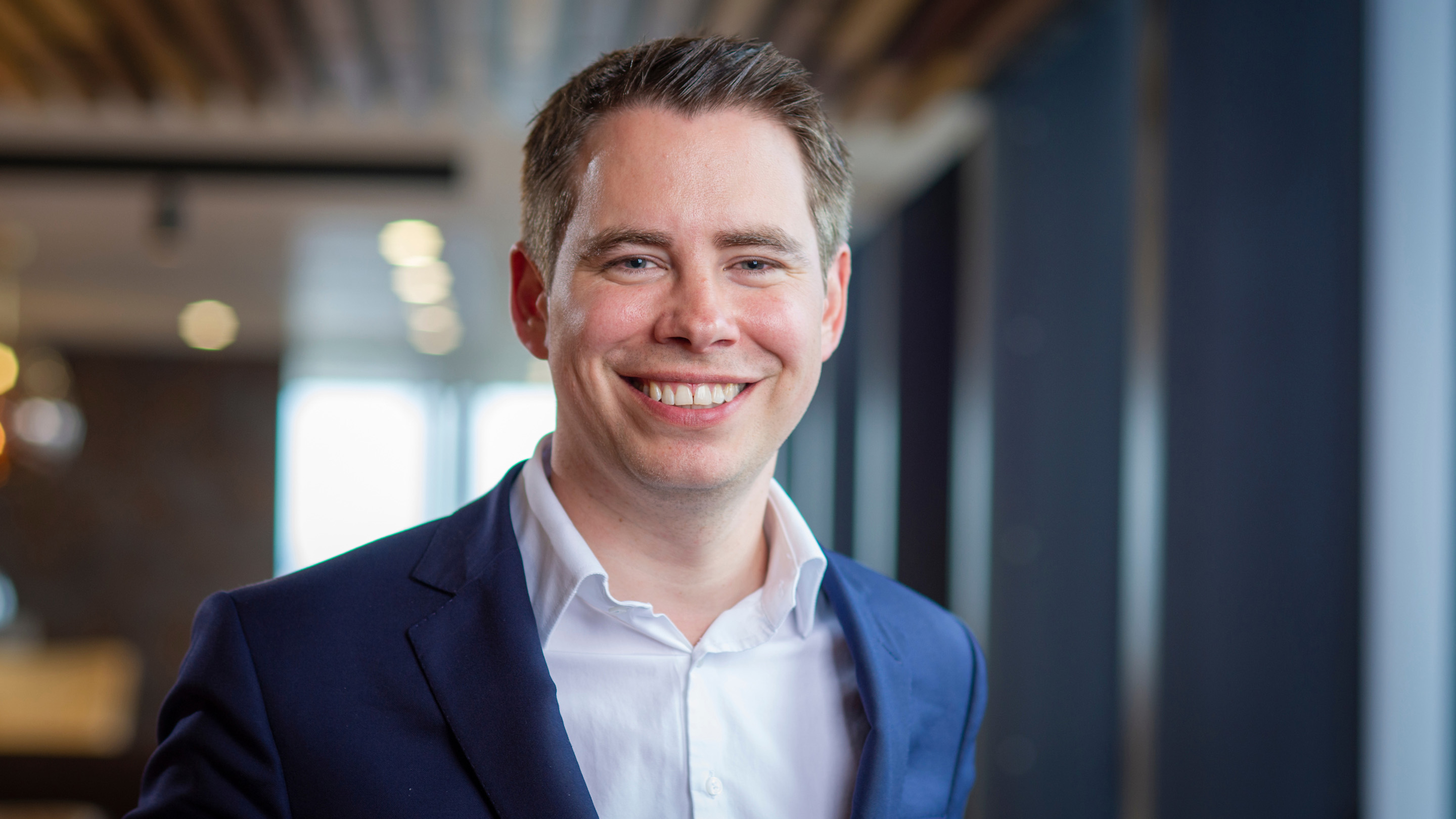
The invention of the car, for example, was a huge innovation. It has, quite literally, reshaped our world. For better and for worse. It also meant insurers had to innovate to keep up.
That, or be overtaken by others.
Seeing down the road.
Thankfully, as insurers, anticipating the unexpected is second nature to us. It’s why we have our innovation team at Aviva, led by our Chief Innovation Officer, Ben Luckett.
Transcript for video Ben Luckett - what is the Chief Innovation Officer role, and what does the innovation team do?
The Chief Innovation Officer role is accountable for helping and supporting the organisation deliver competitive advantage and meet customer needs by delivering new ideas and new technologies.
We split that into three things.
We invest in start-ups through our venture capital fund.
We build new businesses through our venture studio.
We create new products and services through something called rapid proposition development.
“The Chief Innovation Officer role is accountable for helping and supporting the organisation deliver competitive advantage and meet customer needs by delivering new ideas and new technologies.
“We split that into three things.
“We invest in start-ups through our venture capital fund.
“We build new businesses through our venture studio.
“We create new products and services through something called rapid proposition development.”
While innovation isn’t strictly one of our ‘four strategic priorities’ (customer, growth, efficiency, and sustainability) Ben explained that it underpins each of them.
“If we want to better serve customer needs, we need to understand them and innovate.
“If we want to grow, we need new products and services.
Becoming Climate Ready
We want to help the countries we operate in – the UK, Ireland and Canada – become climate ready. So, in 2022 we launched our first Climate-Ready Index. The index measures the G7 countries (Canada, France, Germany, Italy, Japan, United Kingdom, United States) and Ireland because these are some of the richest and most influential in the world, so have a responsibility to lead the way.
“If we want to deliver efficiency, often new technology is really, really helpful for that.
“And from a sustainability perspective, I think if we're going to meet some of our targets, investing in some of the technology, particularly around climate change, that's going to drive a difference is really important.”
The biggest threat facing our planet.
We know that tackling climate change is the best thing we can do for our customers, business, shareholders and future. Just one of the many ways we’re acting is in the products we offer.
Aviva Zero stands out as a major example of this.
It's our carbon-conscious car insurance. For a limited time only, for an entire year after buying a policy, we're offsetting 100% of the carbon emissions that Aviva Zero customers create when driving or charging their car.
We work out their emissions based on the car they drive and their annual mileage, which they tell us about when they buy Aviva Zero car insurance. We also factor in real-world driving conditions that affect fuel use, like weather conditions and car maintenance.
It's an innovative product that's supporting carbon offsetting projects that benefit people and their communities. It's also a great example of how we're driving our sustainability agenda forward through product design.
The innovation team, led by Ben, helped Owen and the Personal Lines part of our business bring Aviva Zero to life.
Acting on climate change
You can visit our climate pages to find out how we're acting on climate change and learn all about our demanding climate goals.
While we are working towards our sustainability ambitions, we acknowledge that we have relationships with businesses and existing assets that may be associated with significant emissions.
Starting from zero.
“I distinctly remember being on the phone one snowy February morning," Ben told us. "For some reason, I was in my garden walking around, taking a phone call. I think that's what we did in lockdown. I was talking to Owen, and we were thinking about the concept of the 'carbon-conscious insurer'.
“The genesis of the idea came from that phone call. That was the beginning of Aviva Zero.”
Owen elaborated on where the journey began for him, and the reasoning behind that phone call.
“It was one of the first things I did when I got this job. I wrote to our Group CEO and said, 'I think we need to make some substantial moves in terms of improving what we're doing in motor insurance'.
“We've got electric vehicles. We've got more data coming from vehicles. We’re going to need to be able to insure electric vehicles for our customers.
“And the thing that triggered it, and hence where the 'zero' came from, and it's really, really important... it's sustainability.
“How do we create a proposition that has sustainability at its core, and we can build out from over time?”
That’s a good question. It’s one we posed to Ben. How do we build a proposition like this? What was the process like?
Traditionally, businesses have started the other way round. They say 'is this something that we can build?' Whereas we start with saying 'is this something the customer will want?'
“The process was taking that idea and making sure that it was something customers wanted and would buy into, and iterating that with customer feedback, building the technology, securing the funding, building a team and getting them into a space where they could operate at pace.”
Keeping our customers at the front of our mind.
“One of the things that we try and do is really understand our customers and understand their needs and design things around those rather than starting with our own internal ideas or with our products.
“And there's a methodology that we use to do that, and that starts with what we call desirability. Understanding if it's something that a customer will want or buy. And then moving through into feasibility and viability.
“Traditionally, businesses have started the other way round. They said, is this something that we can build? Whereas we start with saying, is this something the customer will want?”
Owen told us a bit more about that journey to launch. It was quick, he says. Incredibly quick. It went from the first lines of code on a screen to the launch of the product in just a handful of months.
So, what I like about innovation at a large corporate like Aviva is it's not just affecting a few people or a bit of a niche. We can impact and have a positive benefit for millions of people, and that's what we want to do with Aviva Zero.
After all the work that went into over those months, taking it from code to customer, the launch must have been a big moment for the people who had been involved from the start.
“The excitement is palpable when you first start to see those first customers." Owen shared.
“But I'm actually more excited by a milestone we got last week. We've sold over 30,000 policies now already."
We spoke to Owen in November, so we've hit a few more milestones since then. By the end of January this had increased to 65,000 policies.
“So, what I like about innovation at a large corporate like Aviva is it's not just affecting a few people or a bit of a niche. We can impact and have a positive benefit for millions of people, and that's what we want to do with Aviva Zero.
“I'm really proud of the product.
“I think one of the reasons Aviva Zero worked, is we put the full weight of Aviva behind it.”
“It wasn't ‘Oh, we just let some people get on with it over here'. We’ve got a brilliant team. We work with the best technology outfits. And we've created something that's going great guns.”
What's next?
As for Ben, his team is already working on the next big idea.
“The role of the innovation team is to accelerate new ideas, to test, to learn. And then as we collaborate with the business units, they then take these things over to scale. And we're kind of in that process now, of scaling with Aviva Zero, so the innovation team's role is declining.
“I'm personally still quite involved, but a lot of the team have moved on to look at new and different projects.”
While Aviva Zero is 'going great guns,' history shows that innovations aren’t always a success. That’s part of the process, and a consequence of taking a road less travelled.
Transcript for video Owen Morris - Innovation doesn't always have to be successful
It doesn't always have to be successful, though. I think some of the innovations I've tried over the years haven’t been, frankly.
That's okay. What you’ve got to do is learn from them and build from them. And actually, if you never try anything, you'll never find that out.
“It doesn't always have to be successful, though." Owen said. "I think some of the innovations I've tried over the years haven’t been, frankly.
"That's okay. What you’ve got to do is learn from them and build from them. And actually, if you never try anything, you'll never find that out."
We ended our conversation with Ben by asking him what he sees coming down the road – or at least what he thinks might be.
Transcript for video Ben Luckett - What's coming down the road?
So I think there are a number of things. Insurance will continue to evolve and often in insurance we see evolution rather than revolution.
But there are a few areas that I think are really exciting.
I mentioned earlier about technology driving greater efficiency. And I think we'll continue to see a lot of innovation in automation and artificial intelligence, making things both better for the customer and more efficient.
I also talked about sustainability, which is a really, really exciting, growing area, and I think we'll continue to see innovation there in terms of some of the technologies that can support the decarbonisation agenda and also the ESG reporting agenda.
And then finally, I think insurance is becoming much more customer-centric. A lot of the technologies that we've seen over the last few years are focused on much better customer experience. Making things easier. Frictionless.
I think we'll continue to see innovation in that space and that's really exciting.
“There are a few areas that I think are really exciting.
“I mentioned earlier about technology driving greater efficiency. And I think we'll continue to see a lot of innovation in automation and artificial intelligence, making things both better for the customer and more efficient.
“I also talked about sustainability, which is a really, really exciting, growing area, and I think we'll continue to see innovation there in terms of some of the technologies that can support the decarbonisation agenda and also the ESG (Environment, Social and Governance) reporting agenda.
“And then finally, I think insurance is becoming much more customer-centric. A lot of the technologies that we've seen over the last few years are focused on much better customer experience. Making things easier. Frictionless.
“I think we'll continue to see innovation in that space and that's really exciting.”
Think of an innovative company. What’s the first one that pops into your mind?
Hopefully, with the work that Ben and the innovation team are doing, and products like Aviva Zero, it’s a bit more likely to be Aviva.
Watch our full conversations with Owen and Ben
Transcript
Owen Morris:
So I'm Owen Morris managing director of Personal Lines Insurance at Aviva. Personal Lines Insurance for the uninitiated, is motor insurance, home insurance, travel insurance, van insurance, and private clients insurance... Lots and lots of different types of insurance, but all for individuals.
Ben Moss:
Great. And so tell us a bit more about your role. What does the managing director of that business do?
Owen Morris:
Well, most things! But typically I actually lead a business that's got lots of different parts. So we've got our retail business, which has a managing director of that, who works for me. They look after all the sort of yellow branded products and the Quote Me Happy products. So that's when you see our adverts and things, you'd think about that part of the business.
We actually have a broker business, which is where we sell our products through brokers. It's similar, but lots and lots of customers want to reach us that way. We have some wonderful partners we work with in our partnership business, so we work with banks and we work through lots of different partners that basically go take our products to where our customers need them.
And finally, have a private client business, which is where we help people perhaps who have slightly bigger houses, bigger car collections and art, various other things that need a little bit more work to help work out ‘how do we insure those things for those customers.
And of course, we've got Aviva Zero, which is our new innovation centred, sort of disruptive motor insurance business. Looking: a, to play into sustainability and how we help there in terms of green insurance, but also actually to use technology in new and innovative ways and help us essentially give our customers those digital experiences that we're looking for and use technology to sort of help pay claims faster, predict risk better, and all the things that insurers need to do.
Ben Moss:
Fantastic. We'll come back to Aviva Zero in a moment. Innovation is a really big part of the overall Aviva strategy. But what does it mean? What does innovation mean to you, particularly in your part of the business?
Owen Morris:
Innovation's easy to say and hard to do. I think we all want to be innovative and it's very easy to innovate from an internal lens. I think innovation to me is listening to what customers want. Sometimes what they need. They don't always know what they what they want. In the sense of the iPhone, not many people have said, I want an iPhone when they were still using those little things, but actually they kind of did want an iPhone.
So sometimes you have to interpret what customers say, but when you're doing that sort of innovation. But you have to start with the customer and thinking about the solutions they're looking for, not the solutions you've got, if that makes sense. That, I think, is the key to innovation. Start with the customer.
Ben Moss:
What drives innovation then? Is it companies like Aviva trying to do new things - you mentioned Aviva Zero - or is it more the technology that a business like yours will end up insuring? You know, Internet of Things, self-driving cars, that type of thing?
Owen Morris:
It's a bit of both. So I think what drive, what drives innovation is a little bit of culture in the heart of innovation. I think it's a little bit of... you have to, as a company, be restless with the status quo. It doesn't mean restless for the sake of it, actually. Customers, for example, they want motor insurance and home insurance
They want to be good quality. They want it delivered on time, etcetera, etcetera. You have to deliver that and innovation can be part of that. So there can be bits of that that you want to improve, bits of that you want to enhance, and innovation can be more transformative. And you can want to step change some part of that. All the time, coming back to centering around what the customer needs and drive that way, not the other way round.
Ben Moss:
The UK is, I think, what's known as a mature market in terms of insurance. And Aviva is 325, maybe 326 years old as we’re recording this... Is innovation still possible in a mature market and with a business as old as Aviva?
Owen Morris:
Oh without a doubt! I mean I think I'd describe us as experienced as opposed to 325 years old, but it's a nice way to think about it. I think it shows we're doing something right. You don't survive that long without innovating. So, you know, cars appeared a hundred years ago. Obviously, some of our predecessors had to innovate to cope with this new thing.
And I think they did a good job in creating car insurance. So look for us, you know, for example, car insurance will change. It’s one of the reasons we created... we’ve mentioned Aviva Zero a couple of times, one of the reasons we created it was to make sure that we have the technology sitting underneath our offerings to be able to cope with new sources of data from vehicles, new things customers might want to do, new ways they might buy vehicles, new ways they might actually travel in terms of, you know, ultimately towards autonomy, but certainly in terms of vehicle sharing and the future of mobility.
And I think it's very important that not only is innovation necessarily a new proposition, but it's also innovating how you can create new things in the future. So yeah, it's very important we do innovate. I think you've just got to get it, get it, say I'll come back to it over and over again in this conversation: don’t innovate on what you think customers might want.
Listen to what they're saying, interpret what they're saying, and then try and move in that direction.
Ben Moss:
And about Aviva Zero: So what is the product?
Owen Morris:
So it was it was one of the first things I did when I got this job 18 months ago, is write to our CEO and say “I really think we need to make some substantial moves in terms of improving what we're doing in motor insurance”. Both for the customer - there were a couple of trends that were driving that request - but actually also for ourselves to make sure that we've got the technology to to sort of drive us forward.
So there were three things or maybe four, but three things that drove my request around why we need to move here. The first one was literally, you know, vehicles are changing. We've got electric vehicles. We've got more data coming from vehicles. We going to need to be able to A, insure electric vehicles for our customers, and B, be able to compete with our competitors to make sure that that offering is really good.
Actually, technology itself sitting behind that in the way... not vehicles using data to drive autonomouly, but us using data to actually respond to that so you’ve got the ability for us to create seamless customer experiences in a very different way. So that's kind of sitting there. And the third thing that that triggered, and hence where the Zero came from, and it's really, really important, it's around sustainability and actually thinking about lots of different uses of the word Zero. it's not just about sustainability, but actually how do we really create a proposition that has sustainability at its core and we can build out from over time.
Ben Moss:
You mentioned earlier you said innovation is easy to talk about, but difficult to get right. So in terms of Aviva zero, how did you take that idea... you knowm you start in your new role, you have an idea... “I've got an idea” but in 18 months time, it's a reality. What's that journey like?
Owen Morris:
You got to have a bit of a skin like a rhino! There's no getting away from it with innovation. Because honestly, there is always a desire for the status quo. I think one of the reasons Aviva Zero worked, is we put the full weight of Aviva behind it. It wasn't “Oh, we just let some people get on with it over here.”
Ben Moss:
I think... I'm a big believer in terms of innovation that works for us, has to work at scale. There's no point doing tiny things. What we set out to do with Aviva was build one of the best insurance companies there’s been in terms of core general insurance capabilities, what we’re doing for customers, that proposition... so we put the money behind it.
Owen Morris:
We got a brilliant team. We work with the best technology outfits. And we've really created something that's going great guns. Is it doing everything we ultimately think it will do? No... Do we think it will be, you know, a huge part of the future of motor insurance for us and our customers? Yeah, we do.
Ben Moss:
What's it like when you when you've had an idea within your team, you've had an idea, and then it takes a long time, but then you sort of release it into the world and you start to see - I don’t know if you see it, but the first customer, or the first group of customers, actually click and go, “I'll have that.” What's that like?
Owen Morris:
Oh, it's really exciting. I mean, everyone gets... I remember the launch of it, so we got it live in about six and a half months from the actual first code being cut to launch, which is incredibly fast for a for a proposition of that size and magnitude. The excitement is palpable when you first start to see those first customers.
I'm sort of, you know, slightly older now than perhaps I was, and ten years ago that would have been the height of the excitement. I'm actually more excited by a milestone we got through... oh, probably last week, where we sold you know, we've sold over 30,000 policies now already.
[Filming happened in November 2022. Figures were correct at time of filming.]
And you can start to see the scale coming in and, you know, innovation that's really exciting, but it's just one affecting a few people.
And you've got scale that’s starting to affect 30,000 people. Next year will affect hundreds of thousands more. Then you’re having a real impact. So what I like about innovation at a large corporate like Aviva is it's not just affecting a few people or a bit of a niche. We can impact and have a positive benefit for millions of people, and that's what we want to do with Zero.
Ben Moss:
I think you've answered my next question but I was going to ask: how do you judge the success of a new innovation or a new product?
Owen Morris:
Well, part of it is what I've just said. It's lovely when it comes off. When you start to get scale, you start to make that that difference. You know, primarily, as I say, customers and our shareholders, frankly, it's great to see it coming to life. It doesn't always have to be successful, though. I think some of the innovations I've tried over the years haven’t, frankly. That's okay, what you’ve got to do is learn from them and build from them.
And actually, if you never try anything, you'll never find that out. So I think with innovation, you have to be able to accept it's not going to work. I think my biggest learning in the past is... I learn pretty quickly and try and iterate and try, as I say, the biggest commonality that things that have failed have had is they looked really good on a PowerPoint when people inside these these four walls were looking and going “oh it looks brilliant.”Everyone gets excited. Then we actually put in front of customers and they go “Meh, not so much, thanks.” “I'll have that.” “I quite like what I've already got.” So grounding it in that customer is really helpful. But you will fail quite often with innovation. That's okay. Just try to do it in the sort of small end before you invest too big.
Ben Moss:
OK, come on then, time to get your crystal ball out. What kind of innovation do you see coming in the insurance business over the next few years?
Owen Morris:
So I think when I look at it, I think car insurance will change the most. People have been saying that for over a decade, though. So I think it's over the next few years, over the next 15, 20 years, I think that that's one of the products that will evolve the most, not least as autonomous vehicles come, which they're starting to...
So, look, that's one big thing. I think technology that sits behind insurance will massively grow, evolve, change. I think digitisation is now something customers are demanding. You know, if you go back ten, 15 years, it was sort of almost... I remember when we did Quote Me Happy, which was our first online product. You know, some customers didn't want to do it.
Now, actually, if you haven't got a digital solution it’s [unclear] So that that will continue and Covid's accelerated that. There's huge opportunities for innovation around there. Finally when I think about innovation, I think it’ll probably come in the way some people work. I do think sort of hybrid working and how we all work I think will be quite interesting as that evolves.
And I think look, I think that we're getting the balance pretty good here, Aviva, but you know, we just need to go with that as we go forward. But yeah, there's a few areas, particularly motor, where I think we'll see the most change.
Ben Moss:
And I will ask you this one. It wasn't on the cheap. I've talked to I talked to your colleague Ben Luckett quite a lot of times. Is the Internet of Things going to have an impact, do you think, for me personally?
Owen Morris:
Oh, definitely. I mean, we've all got different views. And I formed The View ten or 15 years ago. The individual things won't be that interesting. They might be in a propositional sense. I do think the Internet of Things, a connectivity will be I think it will go through your phone. I do think that things we now carry around will become the thing that connects most of the other Internet of things and things we connect to your car, probably your home, probably you won't have a separate device or way of interacting with those things.
It's mostly awful in my experience, you know, you're trying to fiddle about with some sort of thing in your house, so you're trying to get that dashboard on your car to work or you're trying to actually it will probably come through this nice interface we all carry around. So my, my own view on how innovation will go is I think that will continue.
And I think that thing we will carry around will be the heart of the Internet things. I think from an insurance perspective, the most important thing is to build that. The ability to connect consumer data that sits behind it, understand customers, build those digital front end experiences. But that kind of middleware of data and managing that and understanding insurance be what customers want.
It's where the where it'll come, first of all, is impossible to know which of those Internet of things is going to be particularly just be ready for it because it come.
Ben Moss:
And the final one... How do you - you personally, as a team, or as an entire business - how do you keep across what innovative... or what innovations are coming down the line, and what the trends are going to be in four or five, six years or even longer? How do you do it?
Owen Morris:
There's a couple of ways. We obviously stay close to our market, our products. But I think one of the wonderful things about being part of Aviva, of being part of a bigger group, is that we have loads and loads of eyes, so we have the benefit of some of the work Ben does in the innovation team. You know,, he just comes along and tap on the shoulders and says
“Have you thought about that? Have you seen that? What do you think of this?” And that is really, really helpful. We’ve got our life and investment colleagues. They're also doing the same thing and they'll, you know, we'll get together and share. So I think when I think about, you know, in the here and now and we'll look at our products but that broader sort of Aviva ecosystem and connectivity I think is one of the key things. It certainly helps me.
I mean if I was just me on my own, I do a reasonable job... But having that the benefit of those Founders Factory connections and all the other things Ben does? Terrific.
Ben Moss:
Owen, thank you very much. It was great to have you. Thank you very much for your time.
Owen Morris:
Yeah, thanks very much, Ben. Absolutely terrific to be here. Innovation is really crucial to what we do and it's great to get a chance to talk about it.
Thank you.
Transcript
Cameron:
Hi, Ben. Can you tell us a little bit more about your role within Aviva? What does the Chief Innovation Officer do?
Ben Luckett:
So the Chief Innovation Officer role is really accountable for helping and supporting the organisation deliver competitive advantage and meet customer needs by delivering new ideas, new technologies. And we split that into three things. We invest in startups through our venture capital fund. We build new businesses through our venture studio, and we create new products and services through something called rapid proposition development.
Cameron:
So innovation is a really important part of Aviva’s strategy. Why is it so important to us?
Ben Luckett:
Yeah, it really underpins our four pillars. So if we want to better serve customer needs, we need to understand them and innovate. If we want to grow, we need new products and services. If we want to deliver efficiency, often new technology is really, really helpful for that. And from a sustainability perspective, I think if we're going to meet some of our targets, investing in some of the technology, particularly around climate change that's really going to drive a difference, is really important.
Cameron:
So I imagine innovation isn't just a bunch of people sitting around in a room. Must be something more to it?
Ben Luckett:
Yeah, no, it's a great question. I mean, people in a room coming up with ideas is part of it, but it's so much more. One of the things that we try and do is really understand our customers and understand their needs and design things around those rather than starting with our own internal ideas or with our products. And there's a methodology that we use to do that, and that starts with what we call desirability - understanding if it's something that a customer will want or buy - and then moving through into feasibility and viability.
Traditionally, businesses have started the other way round. They said, Is this something that we can build? Whereas we start with saying, Is this something the customer will want?
Cameron:
How does the innovation team work with the wider business? Does the business come to you with ideas and requests, or do you come to them with ideas?
Ben Luckett:
To be honest, it's a bit of both. We often engage with the different businesses to try and understand their strategy and how they're working, and they will come with us for requests, particularly around things like partnering with new startups and equally, we spend our time outside in the market, listening to customers, understanding new technologies, talking with our partners in startups and in funds that we invest in to generate some of that insight to create the new ideas.
Cameron:
So Aviva Zero is an example of something our innovation team worked on with our general insurance business, can you tell us how that came to be?
Ben Luckett:
Yeah, absolutely. And I distinctly remember actually being on the phone one snowy February... for some reason, I was in my garden walking around, taking a phone call. I think that's what we did in lockdown. And I was talking to Owen Morris, who runs our personal lines business, and we were thinking about the concept of the carbon conscious insurer.
And that was the beginning really of Aviva Zero. Owen was very passionate about this idea that we could create a new business in motor insurance because there were so many things and still are going on in that part of the industry. It's almost a perfect storm. And the genesis of the idea came from that phone call. And then it got turned into a concept and we wanted to make sure that it landed with customers.
And so the idea evolved from there. And very quickly, actually, it turned from something on a PowerPoint to a product. And that was really the result of working together to collaborating well, using an innovative approach to proposition design.
Cameron:
So what's the process been from getting it from the idea stage to being available for our customers?
Ben Luckett:
Yeah, it's a really good question. And the process was really taking that idea and making sure that it was something customers wanted and would buy into and iterating that with customer feedback, building the technology, securing the funding, building a team and getting that team, as I mentioned, into into a space where they could operate at pace. The barriers were out of the way and it was then iterating rapidly to make sure that we delivered something and we set ourselves a ambitious target of launching before we announced our year end results.
And we did that. And that was, I think, a reflection of a good team working at pace in a dedicated environment with a single minded focus.
Cameron:
So is there anything about Aviva Zero that you're particularly proud of?
Ben Luckett:
Yeah, there are a few things I'm really proud of. Firstly, how we work together as a team collaborating at pace, we put the team in a different space and created a different atmosphere, more like a start up - to really encourage working together quickly and in an agile way and that was fantastic. So innovation is often about a different culture and a different way of working.
And Aviva Zero is a great example of that. I'm also really proud of the technology we took some really interesting technologies and brought them together for Aviva Zero. And finally, I'm really proud of the product. We've launched it into the market in a really short space of time and it's growing fantastically and combining a new product and also a carbon element to that so people can offset their miles that they drive.
I think is really where the future of some of these products is going.
Cameron:
So now that Aviva Zero is launched and live, what's next for the innovation team? Is there still some work left to do?
Ben Luckett:
So the role of the innovation team is to really accelerate new ideas, to test, to learn. And then as we collaborate with the business units, they then take these things over to scale and we're kind of in that process now, of scaling with Aviva Zero. So the innovation team's role is declining. I'm personally still quite involved, but a lot of the team have moved on to look at new and different projects.
Cameron:
So finally, what innovations do you see coming from the insurance business? What do you see for the future?
Ben Luckett:
Yeah, so I think there are a number of things. Insurance will continue to evolve and often in insurance we see evolution rather than revolution. But there are a few areas that I think are really exciting. I mentioned earlier about technology driving greater efficiency, and I think we'll continue to see a lot of innovation in automation and artificial intelligence, making things both better for the customer and more efficient.
I also talked about sustainability, which is a really, really exciting, growing area, and I think we'll continue to see innovation there in terms of some of the technologies that can support the decarbonisation agenda and also the ESG reporting agenda. And then finally, I think insurance is becoming much more customer centric. A lot of the technologies that we've seen over the last few years are focused on much better customer experience, making things easier, frictionless.
I think we'll continue to see innovation in that space and that's really exciting.
Cameron:
Thank you very much for your time today, Ben. Is anything else you'd like to add?
Ben Luckett:
Well, thank you. It's been great talking to you. I guess I would finish just by saying that, for me, innovation is very much about collaboration. We've talked about that. But I think in an organisation like Aviva, what you really need to do is be able to work together to make sure that those ideas don't just stay as ideas, but actually get to our customers in a really good and quick way.
More of our stories
-

Features
Nature isn’t always a walk in the park
20 Nov 2024
From pond-dipping nets to British Sign Language trails, the Aviva Access to Nature Fund is helping make Norfolk’s outdoors everyone’s outdoors.
-

Features
The story behind everything you own
28 Oct 2024
From bourbon bobbing on barges to Van Goghs crossing continents, Howard Potter's team helps protect global trade in ways you'd never expect.
-

Features
"You can't teach someone to budget their way out of poverty."
26 Jul 2024
The Aviva Foundation wants people to feel in control and positive about their financial futures. Find out how they are supporting organisations to transform the lives of those who need it the most.
-

Features
Who remembers the forgetters?
28 Jun 2024
Meet the man who reunited our customers with a billion forgotten pounds.
-
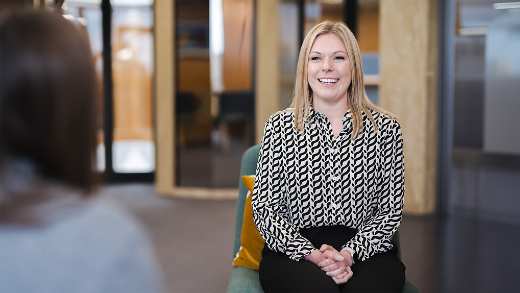
Features
Who’s behind our multi-million-pound deals?
15 Feb 2024
Emma, from our bulk purchase annuity (BPA) team, sheds light on the human side of the deals she works on.
-

Features
Finding a way forward through difficult times
10 Jan 2024
Citizens Advice believes that no-one should face problems without good quality advice. Hear how Aviva is helping them provide it.
-

Features
Retirement: the longest holiday you’ll ever plan
22 Nov 2023
In this episode of the Aviva Podcast, Steve and Tom unpack workplace pensions.
-

Features
From ashes to algorithms: how partnerships shape the future
9 Aug 2023
Aviva's deep experience meets Lemonade's AI innovation. It's all about bringing together the best of both worlds.
-

Features
Bringing rainforests back to the UK
22 Jun 2023
Somewhere between the White Cliffs of Dover and the Giant’s Causeway, some of the UK’s most beautiful natural wonders are growing. But they’re also shrinking.
-

Features
What happens to forgotten assets?
5 Jun 2023
Aviva is the first company from the Insurance and Pensions sector to join the expanded Dormant Assets Scheme.
-
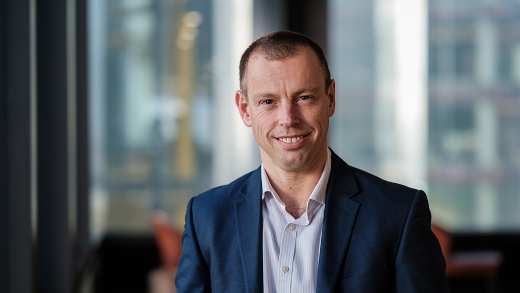
Features
The Billion Dollar Man
3 Jan 2023
Matt Gordon can personally approve cover close to $2 billion. But how do we weigh up the risks when we insure something new?
-

Features
Aviva Pride: amazing, supportive and hopeful
27 Jun 2022
David, Jenny and Jason share their stories of what Aviva's Pride community is all about, why it’s so important, and what it means to them.
-
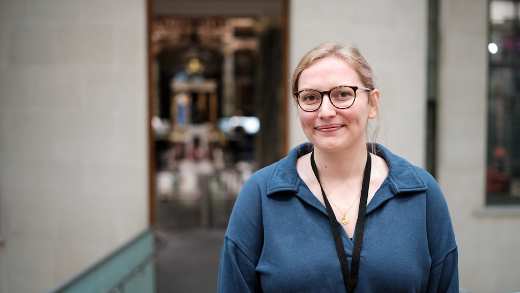
Features
Our Freya: “How did it take 26 years?”
21 Jun 2022
Freya MacLachlan, Digital Product Owner, on creativity, frustrations, and masking.
-

Features
Our carers community: compassionate, caring and resilient
7 Jun 2022
Listen in as Martin, Natalie and Kofi share their stories of why Aviva Carers is so important, and why the community means so much to them.
-
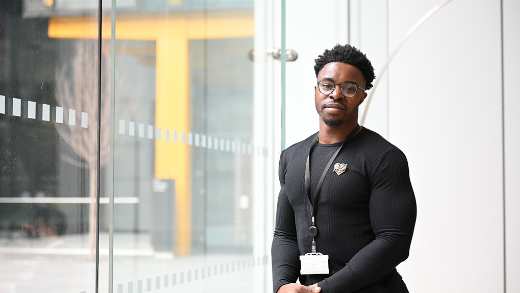
Features
Our Kofi: “How could you be so… human?”
6 Jun 2022
Kofi Eschoe-Wilson, Customer Service Consultant, on competing for his country, turning down Cirque du Soleil, and tackling taboo.
-
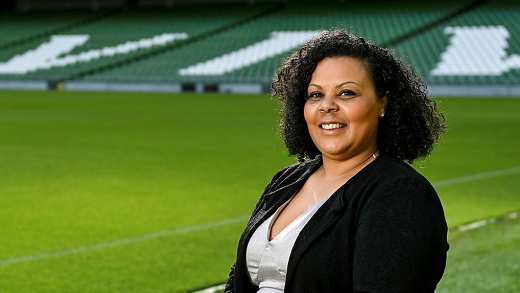
Features
Our Taryn: “They call me a conjuror of the dark arts”
5 May 2022
Taryn Siwale, SEO Manager in Aviva Ireland, on how to be found.

















